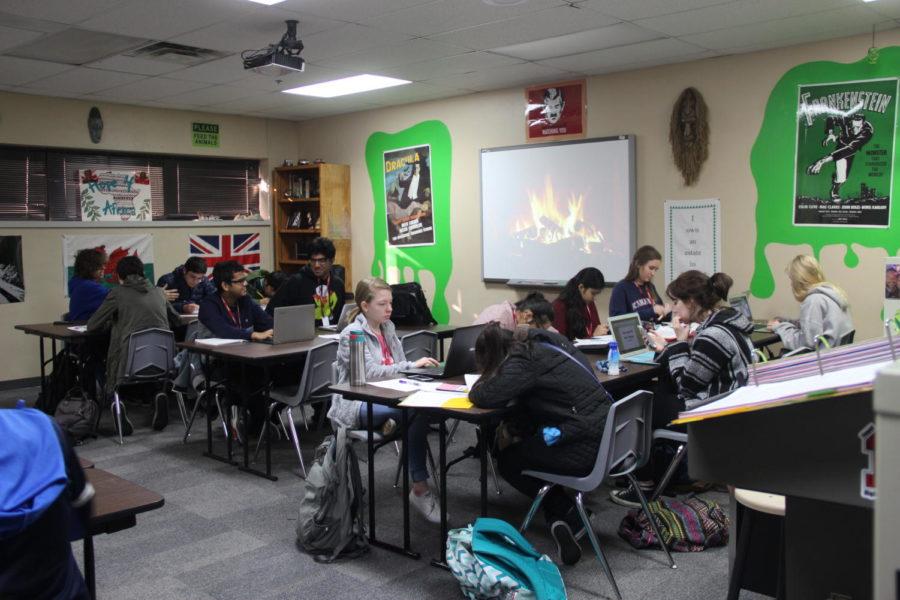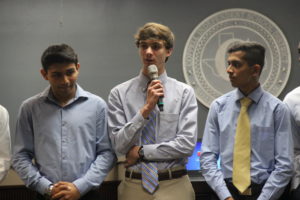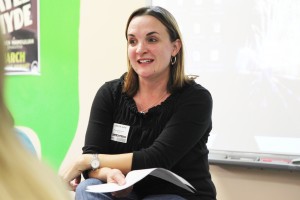Aspiring authors should chase their dreams with backup plan in tow
Matthew Bowden’s first period creative writing students work on their childrens book projects. Bowden offers this class to grow students’ passion for writing and hone their skills for the craft.
December 8, 2017
Staying up hours past my bedtime to write under my covers, sneaking a notebook under my desk to write during my classes, falling asleep to the voices of characters I had made up running through my mind- ever since I developed a strong passion for writing when I was 8 or 9 years old, all these things have been regular parts of my life.
As children, many often speak of wanting to undertake professions in art, writing or sports – among other careers deemed “unrealistic.” Adults in their life will smile and wave it off, assuming their childish dreams will fade with time as more rational goals replace them.
However, many children and teenagers remain grounded in their “unrealistic” dreams as they age. Becoming a well-established author has been my biggest goal for over four years. Over this time, I have put a lot of work into improving my writing; it has been one of the things I have worked hardest at in my life.
For many teenagers who dream of being writers, writing is a predominant aspect of their lives. It is something they dedicate much of their time toward.
“Writing is one of the most important parts of my life. I try to write whenever I can,” CHS senior Creative Writing Club president Sarah Low said. “I’ve taken creative writing classes throughout middle school and high school.”
Low has also entered her work into the annual Coppell Gifted Association (CGA) writing contest six times, which shows her dedication to the craft.
Is it right to tell teenagers who take writing so seriously that turning their passion into a career is far too unrealistic? No, because it is not too unrealistic, but it is good to remind them to have a backup plan.
For the majority of the population, it takes years to hone their craft of writing, and even longer to build a name for themselves in the publishing world. Doing so requires immense passion and perseverance.
Sophomore Jaxson Shealy is a member of the CHS Creative Writing Club, and plans to pursue the club president position next year. Like Low, he is a dedicated writer who has participated in the annual CGA writing contest multiple times.
“It really depends how much you want it,” said Shealy, when asked his thoughts on whether aiming to be an author is unrealistic.
Publishing a book is not terribly unrealistic if one is willing to put their mind to it, but it is undeniable that the path to becoming a writer generally is not as clear cut as that to becoming a doctor or lawyer. Studying literature at Oxford, which is arguably the No. 1 university in the world for English, offers little advantage in the publishing industry, but test scores and universities can drastically sway one’s success in professional careers.
Additionally, luck and timing, which are both out of the writer’s control, play a big part in their publishing success.
Because of this, it is difficult to estimate how successful a person will be in the writing world, and whether they will be able to make enough money to sustain themselves based on the earnings from their writing alone. More often than not, they will not be able to – at least not at first.
This means aspiring writers must always have a backup plan.
“You should always have a main job,” Shealy said. “If you write on the side and become successful, then you can go full time.”
This however, should in no way discourage you from writing. If you want to write, then write. Keep writing even if those around you say you are wasting your time or try to pull you down. Keep writing even if you are repeatedly rejected and told you are not good enough.
“Everyone thinks [becoming an author] is too unrealistic until they actually do it,” Low said.
But also remember that, in the publishing world, there are so many factors. Hard work and success do not always have linear relationship.
Plan your future accordingly.
Follow Pramika @pramika_kadari













